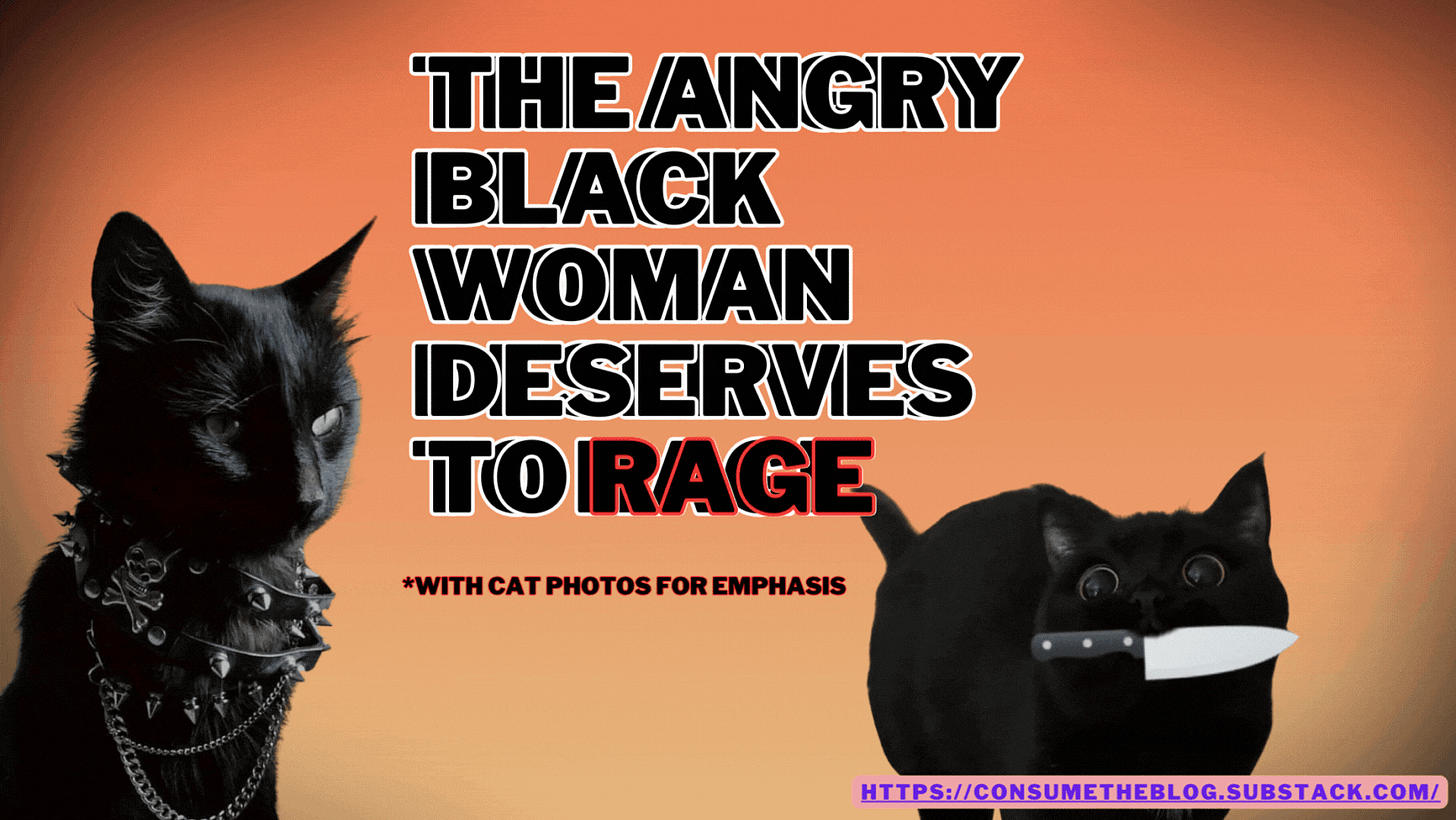Every woman has a well-stocked arsenal of anger potentially useful against those oppressions, personal and institutional, which brought that anger into being. Focused with precision it can become a powerful source of energy serving progress and change. And when I speak of change, I do not mean a simple switch of positions or a temporary lessening of tensions, nor the ability to smile or feel good. I am speaking of a basic and radical alteration in all those assumptions underlining our lives. - Audre Lorde (1981) “The Uses of Anger”
Sometimes I think about the last 4 years and want to spontaneously combust taking everything in the solar system with me. Sometimes I think about the last 400 years and want to spontaneously combust too, but I can’t. Instead, I pack it neatly into the too-complex-to-solve door in the background of my mind. There it does not stop me from functioning on a day-to-day basis. There it must rest until, on occasion, I crack the door open just a tad letting slip just the wittiest bit of fuckedupness the human race has perpetrated against us… me… mine.
For a very long time and much of my youth race was not something I thought about much. In fact, I admit, as an adult it is not often in the forefront of my mind. To clarify, I having spent the better half of my early youth growing up in the West Indies surrounded by primarily Black people have a slightly different relationship with race than my Black American friends who grew up with consistent reminders of whiteness everywhere. This is of course a natural consequence of differences in the percentage of race relative to population demographics between the U.S.A. and The West Indies particularly during slavery and the subsequent years.
“the slaves in the United States had more extensive contact with white society in their daily lives. This point should be kept in mind when examining the cultural adjustments of slaves in the New World and in the search for the persistence of African carryovers as contrasted with European adaptations. Moreover -also reflecting the impact of climate and the possible crop mix-in the United States, even in the South, the slaves were basically in a white society: even in those states with heaviest concentrations of slaves, whites represented one-half of the population. In the West Indies the share of whites was generally on the order of 10 per cent.” (Engerman 265)
Moving to the US on the cusp of my teenage years was like having wax wiped from my eyes. There are so many nefarious ways that racism functions here (the U.S.A), that is not to say that there aren’t where I grew up, but the machine is so much more layered and efficient here. The roots are deep and twisted and when perfectly paired with its older sister, capitalism, has a nefarious way of making life more miserable than it needs to be. You could imagine my dismay then at learning of the concept of the angry Black woman. Imagine my further dismay at its use as a means of stifling not only the self-expression of Black women, but also forcing a sort of consistent self-monitoring to ensure that they are perpetually unoffensive; an especially efficient tool for keeping the Black woman in check.
Now I know that someone out there might argue that anger is not always the answer but sometimes it is. Sahi writes “Expressions of anger and disappointment can change a wrongdoer’s harmful behavior by triggering complementary or reciprocal emotional reactions in a wrongdoer. As a target of anger, people tend to feel fear, which is unpleasant. To avoid feeling fear, people often avoid the harmful behaviors that cause people to be angry.” (Sahi 65). The fear generated by anger motivates action to either change or retaliate however, if you get enough people to overregulate their anger, then you force them to minimize your job of having to manage the public perception of their anger. It minimizes the instances that anger has to be held to the light, evaluated, understood, validated, and eventually acted upon. Lastly you never have to face your actions and course correct as a natural reaction to anger.
As I’ve mentioned before in “Life is for Consuming”, the current mode of operation of society is particularly sad because it works counterintuitively for maximal happiness as an output/outcome. Think of all the things that would make your life easier and happier and capitalism (and racism) has found a way to take a big shit on it AND make you pay to wipe it up! On top of that, there will be constant reminders (read threats) that you better not complain too loudly because it could be so much worse.
Access to safe and healthy food. Yeah right.Affordable housing?! Yeah right. The ability to spend time raising a family and building community!? Laughable. There’s no worse partner to capitalism than a strong familial and community unit. After all, what would you be able to accomplish working in unity?
That being said here is a list of some things I’ve been mad about recently
Covid (As a concept, as a virus, just for existing, killing, harming. BOOOO! Hate it. Also for making me cancel my honeymoon I had planned in 2020. Also for taking two of the matriarchs in my family.)
Bird flu (for not knowing how to read a room. We’re already dealing with enough.)
CDC for not doing their job. (Not interested in debating or engaging about this one.)
FDA (The list is long here but LEAD IN LUNCHABLES. Get some standards!)
Religion *as a pacifying agent*. (No inherent beef with religion itself just its use as a pacifying agent.)
Entertainment (as a pacifying agent)
Inflation (fighting disease and having to fight price hikes too. ENOUGH)
Government officials being able to buy and trade stocks.
We’re slowly regressing to the cable method. (Also Amazon just decided they have tiers for Prime Video now?! Don’t piss me off)
The five day work week.
The globe for warming. (I know it’s not responsible for itself but also … like fight back!)
Diaspora Wars
People who don’t re-rack their weights
The degradation of Carnival culture
Misinformation or no information about public health crises (see 1-4)
If you’ve made it this far good on you. Sometimes the anger is a little much all at once and trust me when I say this is a short and light-hearted list. If you are a Black Woman out there let me tell you that your anger is valid. Your anger does not always need to be pacified, packed away, or tip-toed over like so many small pieces of legos tossed across the messy ass globe. It should and can be built a great towering wall of rage stopping any and everything in your path with enough effort, skill, and unity. Perhaps… perhaps that’s why we’ve been taught to try our best to not be perceived as the angry Black *girl*. If you spend long enough pretending you have no time to spend analyzing the why or finding and working towards a resolution.
“It is not a performance of Blackness–she is a Black woman. And these movements are hers, just like they were her mother's. Just like they were her grandmother’s. A tradition of survival. She's learned how to get her point neatly: a knife in a drawer full of spoons. She's always accused of being too "rough" on people. Which is where our sisterhood thickens, molasses strong.
I too have lived on that block, in that house, first door to the right and you could find me: Angry Black Girl/Strong Black Girl/Girl You Call On When You Need to Get Things Done.” (Browne 49)
Sometimes our anger is the only thing keeping us alive. Many times the resolution lies in our anger.
Citations
BROWNE, MAHOGANY L. “On Black Girl Magic.” Poetry, vol. 212, no. 1, 2018, pp. 49–51. JSTOR, http://www.jstor.org/stable/26493272. Accessed 16 Apr. 2024.
Engerman, Stanley L. “Some Economic and Demographic Comparisons of Slavery in the United States and the British West Indies.” The Economic History Review, vol. 29, no. 2, 1976, pp. 258–75. JSTOR, https://doi.org/10.2307/2594314. Accessed 16 Apr. 2024.
Lorde, Audre. “The Uses of Anger.” Women’s Studies Quarterly, vol. 25, no. 1/2, 1997, pp. 278–85. JSTOR, http://www.jstor.org/stable/40005441. Accessed 16 Apr. 2024.
Sahi, Razia S. “It’s Okay to Be Angry: A Functionalist Perspective of the Dangers of Overregulating Anger.” Philosophical Topics, vol. 47, no. 2, 2019, pp. 53–74. JSTOR, https://www.jstor.org/stable/26948106. Accessed 16 Apr. 2024.
Bonus Cat Video I saw online this week for your viewing pleasure
Whew! I would actually love to expand on this piece. There are so many nooks and crannies to explore regarding this topic but I have decided to release it into the wild. I’m sure with enough time and evidence/articles the ideas here will become even more refined. I am excited to see what happens next.
TELL ME:
Did any part of this piece particularly move you? Catch you by surprise?
What have you been mad about lately?
What have you been happy about lately?
For all of you who have already subscribed thanks so much!! For those of you who haven’t subscribed yet, it’s never too late to join my smart and funny subscribers (nickname sadly still pending)!
As usual tune in next Tuesday for my latest newsletter.










I felt this post, and I also am deeply angry with Covid and everything else you listed. But especially Covid! It’s just so damn demoralizing.
On a side note, I would love to hear more about your experience in America as someone who came here in your teens. As usual, thanks for this great read!
Anger is a natural emotion, and you’re correct, to expect black women not to express emotion, is implying that we are less than human - and the idea that society perpetuates that ignorant ass implication induces rage. Thanks for writing this.